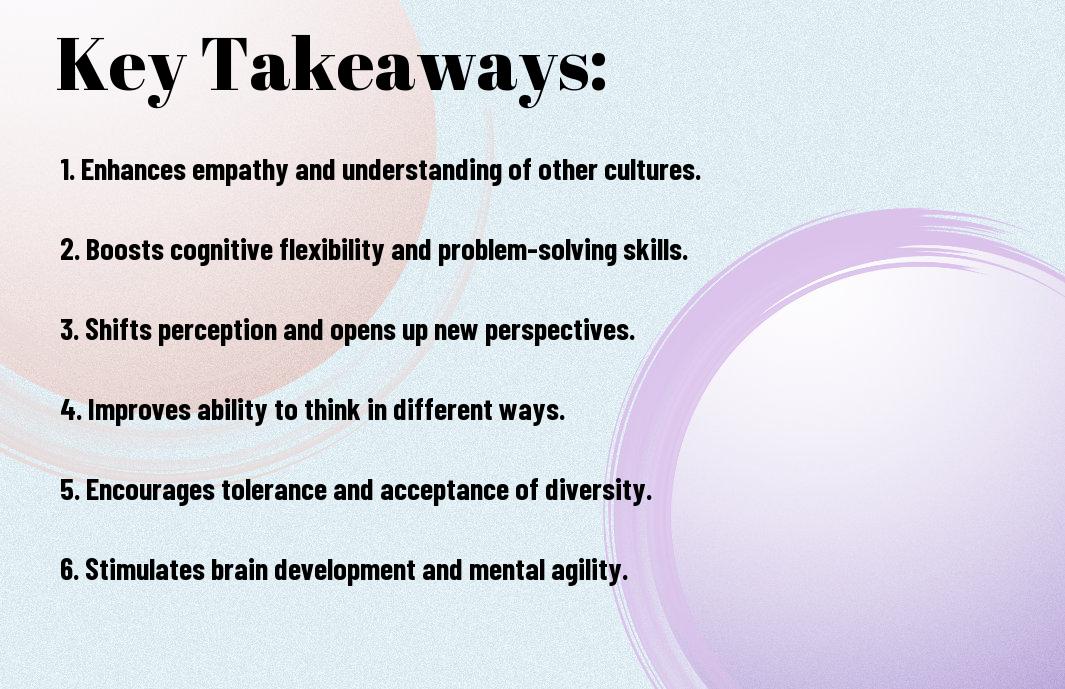There’s a fascinating shift in your perceptions and thinking when you explore into learning a new language. It’s as if a whole new world opens up before your eyes, shaping how you see things around you. In this blog post, we will explore the profound impact that learning a new language can have on your worldview and cognitive processes, shedding light on the transformative journey that awaits you.
Key Takeaways:
- Language shapes thought: learning a new language can broaden one’s perspective and influence how they perceive and interpret the world around them.
- Cognitive flexibility: mastering a new language can enhance cognitive abilities such as problem-solving skills, multitasking, and decision-making.
- Cultural understanding: acquiring a new language can lead to a deeper understanding and appreciation of different cultures, fostering empathy and tolerance.

The Cognitive Shift
Neuroplasticity and Language Acquisition
The process of learning a new language goes beyond just acquiring vocabulary and grammar rules; it actually reshapes your brain’s structure and functioning. An individual’s brain is remarkably adaptable, a quality known as neuroplasticity. When you immerse yourself in a new language, your brain forms new neural pathways and connections to accommodate this linguistic information.
Rewiring the Brain: A New Perspective
Neuroplasticity allows for the rewiring of the brain in response to new stimuli, such as learning a new language. This means that your brain can physically change in structure as you engage with and practice a new language. As you continue to learn and use the new language, these changes become more pronounced, leading to enhanced cognitive abilities and a broader worldview.
Acquisition of a new language can lead to improvements in cognitive functions such as problem-solving, multitasking, and even delaying the onset of dementia in later life. This cognitive shift not only enhances your linguistic abilities but also enriches your overall cognitive processes, contributing to a more profound and interconnected worldview.
Language and Perception
Some argue that the language you speak can significantly influence how you perceive the world around you. This idea is rooted in the Sapir-Whorf Hypothesis, which suggests that the structure and vocabulary of a language shape the thoughts and perceptions of its speakers.
The Sapir-Whorf Hypothesis: A Debate
SapirWhorf The Sapir-Whorf Hypothesis has sparked a long-standing debate in the field of linguistics and cognitive science. While some researchers believe that language determines how we think and perceive reality, others argue that it simply influences our thoughts and behaviors to a certain extent.
Color, Time, and Space: How Language Shapes Reality
To investigate deeper into how language influences perception, let’s consider how different languages categorize colors, express time, and conceptualize space. For example, some languages have more precise terms for colors, which could impact how speakers distinguish between shades and hues.
It is fascinating to explore how language can shape your perception of the world, influencing how you see colors, interpret time, and understand spatial relationships. By learning a new language, you may gain a different perspective on these fundamental aspects of reality, expanding your worldview and cognitive processes.

Cultural Immersion and Worldview
Not only does learning a new language grant you access to a different means of communication, but it also provides you with a gateway to understanding diverse cultures and broadening your worldview. Through cultural immersion, you not only learn vocabulary and grammar rules but also the social norms, values, and traditions that shape the way people from that culture view the world.
The Power of Contextual Learning
Cultural immersion allows you to absorb language in its natural habitat, surrounded by native speakers who embody the nuances of the culture. By experiencing firsthand how language is used in different contexts, you gain a deeper understanding of how culture influences communication styles, gestures, and even humor. This immersive experience not only enhances your language skills but also fosters a greater appreciation for diversity and encourages you to see the world from multiple perspectives.
Unconscious Bias and Cultural Assumptions
To understand the impact of unconscious bias and cultural assumptions, consider how language reflects societal norms and values. Your native language shapes your thought patterns and perception of the world, often leading to unconscious biases that influence your interactions with people from different cultures. By learning a new language, you become more aware of these biases and assumptions, allowing you to challenge and reshape your perspectives based on a deeper cultural understanding.
Assumptions and stereotypes can unintentionally impact your worldview and how you interpret the actions of others. Learning a new language can help you break down these barriers by exposing you to different cultural contexts and ways of expressing ideas. By actively engaging with a new language and culture, you can begin to unravel your unconscious biases and develop a more inclusive and open-minded perspective.

The Role of Emotions in Language Learning
Unlike other cognitive processes, language learning is deeply intertwined with emotions. Your emotional state can significantly impact your ability to learn a new language and influence how you perceive the world through that language.
Emotional Intelligence and Empathy
Role of emotional intelligence in language learning cannot be overstated. When you develop your emotional intelligence through learning a new language, you become more attuned to nuances in communication and better understand cultural cues. This heightened sensitivity fosters empathy, allowing you to connect more deeply with others, both linguistically and emotionally.
The Emotional Connection to Native Speakers
Speakers of a language are not merely conveyors of words but carriers of emotions, traditions, and cultural insights. When you establish an emotional connection with native speakers while learning a new language, you gain invaluable insights into their way of life, beliefs, and values. This emotional bond goes beyond words, enriching your language learning experience and broadening your worldview.
A strong emotional connection to native speakers can break down barriers and facilitate a deeper understanding of their language. It allows you to see the world through their eyes, leading to a more profound appreciation of their culture and a more authentic grasp of the language nuances. This emotional journey in language learning enriches your cognitive processes and broadens your perspectives in ways you never imagined.
The Impact on Critical Thinking
An Analytical Reasoning and Problem-Solving
For analytical reasoning and problem-solving, learning a new language can significantly enhance your cognitive processes. When you learn a new language, you are exposed to different language structures, grammar rules, and vocabulary. This exposure challenges your brain to think in new ways and find solutions to linguistic puzzles. As you grapple with unfamiliar words and sentence structures, your brain actively engages in analyzing and problem-solving, which in turn strengthens your critical thinking skills.
Enhanced Cognitive Flexibility
For enhanced cognitive flexibility, the process of learning a new language forces you to adapt to different linguistic contexts and cultural nuances. Your brain becomes adept at switching between languages, constantly making decisions on which language to use in specific situations. This constant toggling between languages enhances your cognitive flexibility, allowing you to think more creatively and consider multiple perspectives when approaching problems.
With improved cognitive flexibility from language learning, you become more adept at multitasking and adjusting to new environments. Your brain becomes more nimble in switching between tasks and considering various viewpoints, leading to more agile and adaptable thinking patterns. This cognitive flexibility gained from learning a new language can have a profound impact on your critical thinking abilities in various aspects of your life.
The Interplay between Language and Identity
Despite the complexity of the relationship between language and identity, it’s clear that the language you speak plays a significant role in shaping how you see yourself and how others perceive you. Language is not just a means of communication; it is a powerful tool for self-expression that reflects your cultural background, experiences, and beliefs.
Language as a Tool for Self-Expression
One of the key ways in which learning a new language can influence your worldview is through the different nuances and subtleties that each language carries. When you learn a new language, you not only gain the ability to communicate with a broader range of people, but you also gain access to a different way of thinking and expressing ideas. This can expand your perspective and allow you to see the world from a new vantage point, enriching your understanding of different cultures and ways of life.
Code-Switching and Identity Formation
On your journey of learning a new language, you may find yourself engaging in code-switching, the practice of alternating between two or more languages in conversation. Code-switching is not just a linguistic phenomenon; it is also deeply tied to identity formation. By code-switching, you can adapt your communication style to different contexts and social settings, showing different facets of your identity depending on who you are interacting with. This fluidity in language use can shape how you perceive yourself and how others perceive you, allowing you to navigate complex social situations and diverse cultural spaces with ease.
Another aspect of code-switching is its role in affirming and preserving cultural identities. By using multiple languages in your daily interactions, you can maintain a connection to your heritage and roots, reinforcing your sense of belonging and enriching your cultural identity. Code-switching becomes a way to bridge different aspects of your identity, creating a unique linguistic and cultural tapestry that reflects the richness of your background and experiences.
Conclusion
So, as you launch on the journey of learning a new language, remember that it is not just about acquiring words and grammar rules. It is about expanding your worldview, enhancing your cognitive processes, and forging connections between different languages and skills. According to a study by the National Centre for Languages, speaking multiple languages can influence your thinking patterns, problem-solving abilities, and decision-making skills. The more languages you learn, the more flexible and adaptable your mind becomes, allowing you to navigate through diverse cultural landscapes with ease. Check out more about this fascinating topic in the article Speaking your mind: links between languages and other skills.
Q: How does learning a new language influence one’s worldview?
A: Learning a new language can broaden one’s worldview by exposing them to different cultures, traditions, and ways of thinking. It allows individuals to see the world from different perspectives and enhances their empathy and understanding of diverse communities.
Q: How does learning a new language affect cognitive processes?
A: Learning a new language can improve cognitive processes such as problem-solving, multitasking, and memory. It challenges the brain to think in a new way, strengthens neural connections, and enhances overall cognitive function.
Q: What are some benefits of learning a new language on worldview and cognitive processes?
A: Some benefits of learning a new language include increased cultural awareness, improved communication skills, and enhanced creativity. It allows individuals to break down barriers, build connections with others, and stimulate mental agility and flexibility.


